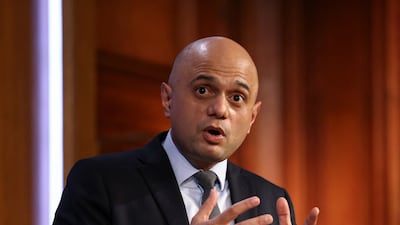Britain’s health secretary has defended his comparison of Covid-19 and the flu, saying the country must learn to live with the virus because “it could be with us forever”.
Sajid Javid delivered the stark forecast as he insisted England is ready to lift Plan B restrictions — a move that will bring millions of people back to work places and end mandatory Covid-19 passes for crowded venues.
Mr Javid, who is seen as a potential prime ministerial candidate if Boris Johnson is forced to step down over the party scandal, laid out his vision for easing society back into a more normal routine with the threat of the coronavirus remaining.
He said England’s booster vaccine campaign, antiviral drugs used to treat Covid-19 patients and the testing regime had played key roles in bolstering the country’s defences against the disease and made it possible to keep the economy open.
He defended his decision to put the virus on par with the flu, despite some being ridiculed for making such a comparison early on in the pandemic.

“We need to learn to live with it,” Mr Javid told Sky News. “Sadly, people die of flu as well.
“In a bad flu year you can sadly lose about 20,000 lives but we don’t shut down our entire country and put in place lots of restrictions to deal with it.
“We need to continue with our lives, with sensible, appropriate and proportionate measures.
“Covid is not going away. It’s going to be with us for many, many years, perhaps forever, and we have to learn to live with it.”
The health secretary said further down the line an annual vaccine could be offered to people, much like the yearly flu shot.
He said “we may well have” an annual Covid-19 vaccination programme for people, adding: “I think that’s where we will probably end up.”
He said the UK is “leading Europe in the transition from pandemic to endemic and we’re leading the way in showing the world how you can live with Covid”.
On Wednesday the government announced that the Plan B restrictions would expire on January 29.
The set of measures were introduced in early December in response to the rapid spread of the Omicron variant of the disease.
The changes will mean that from next Thursday people in England will no longer be required to work from home and will not have to wear face masks in public indoor settings and on public transport.
Crowded venues will not have to check whether patrons have been vaccinated or have tested negative for Covid-19.
Instead, the National Health Service Covid pass scheme will be voluntary and managers can choose to drop it or continue with it.
Ministers have also decided that the legal requirement for people with coronavirus to self-isolate will also be allowed to lapse when the regulation expires on March 24. However, that date could be brought forward.
Mr Javid left the door open for the rule to be extended though.
“We will decide as we get closer to March based on the data at the time,” he said.
The move could help appease Mr Johnson’s critics in his own party at a time when he is under intense pressure over alleged Downing Street parties.
The inquiry into the gatherings is expected to be published next week and Mr Johnson has pledged to make a statement in light of the findings.


